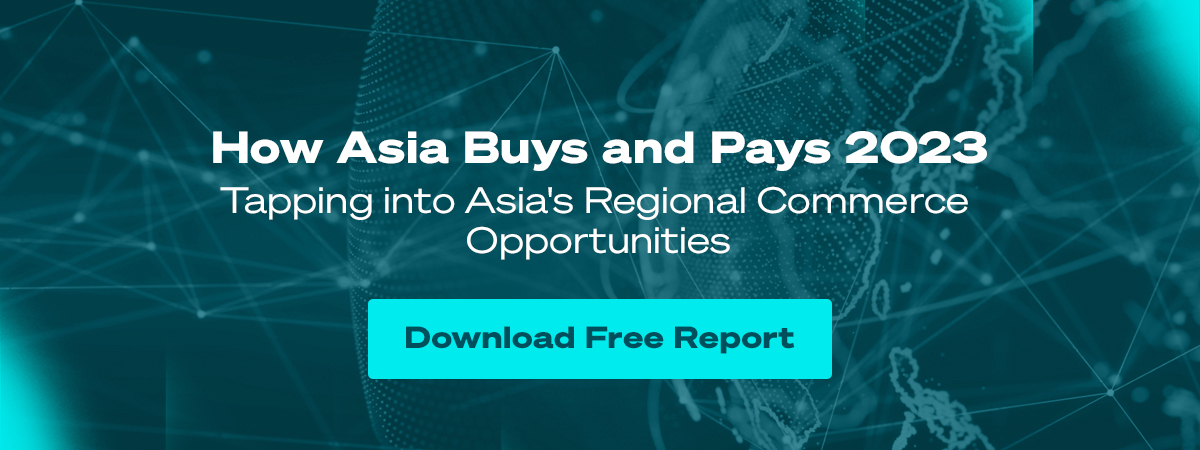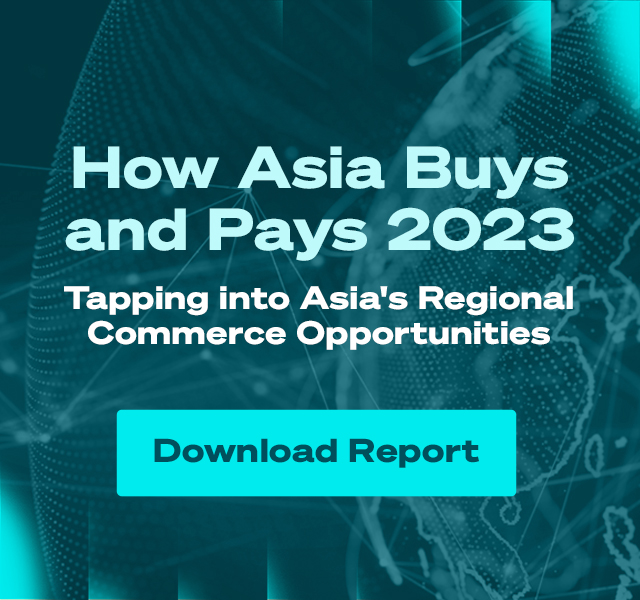
Payments Powerhouses: Digitalising Payments for Hotel Bookings
Payments Powerhouses is a monthly series featuring trailblazers on Southeast Asia’s fintech scene. In the seventh instalment of the series, we speak with Anthony Green. An expert in ecommerce, content management systems, and multilingual web solutions, Anthony heads the digitalisation of Minor Hotels as its Group Director of Digital Applications & Platforms.
Under Minor Hotels, Anthony has lent his expertise to various hotel websites, including Anantara.com and Avanihotels.com. He has also worked his ecommerce proficiency into each of these websites, implementing booking engines that focus on increasing revenue.
Hi Anthony, tell us about your career journey. Why did you move to Bangkok and enter the hospitality industry?
Anthony Green: I worked in IT in the UK in the ‘90s before deciding to look for challenges in this part of the world. Bangkok in the late ‘90s and early 2000s was in a startup era of sorts. I started working for some VC-funded startups and software companies before specialising in hospitality by doing hotel websites. I joined a hospitality-focused branding agency before moving to Minor Hotels six years ago. So I’ve been in the industry for nearly 20 years; it’s a constantly changing environment and super interesting.
Tell us more about your role at Minor Hotels.
Minor Hotels is a fast-growing company – back in 2005, we only had five hotels operating under our own brands, and today we've got over 500 properties.
In my role, I consolidate the different technologies used for Minor Hotels’ acquisitions worldwide. Through the consolidation, we gain some scalability by concentrating all our resources in one place. This solution allows us to operate across various brands without having to juggle multiple different technology stacks.
I've got my team of developers who help manage and build all the new features on the platform. I get to play with cool technology and deal with people all over the world - it’s a great job!
What are your thoughts on the digital transformation of the hospitality sector? How was this applied to Minor Hotels?
Minor Hotels has always been very forward-looking and entrepreneurial. Our founder is a self-made billionaire, and he remains very active in the company, always looking to try new things.
Bringing this down the organisation funnel, we can always persuade our bosses to give us the money to try something new, learn the lessons, and then we move on.
We’re in a constant process of transformation and like to think that we’re at the forefront of the hospitality industry’s digitalisation. Many other hotel groups around the world take the lead from us and try to emulate our example. We’re always prepared to take risks and be the first - this is a core part of Minor Hotels’ culture.
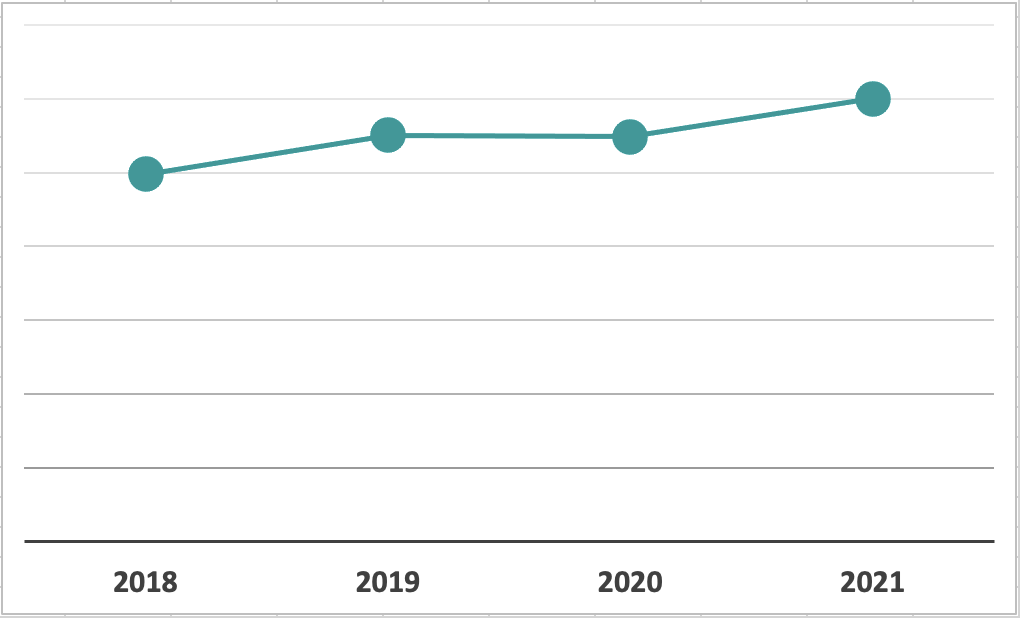
% Increase in transactions made on Minor Hotels’ websites since the start of digital transformation
Share with us a game-changing idea that has gone live.
When I first came in, Minor Hotels had many websites running on different technologies - it was an absolute nightmare to do anything. If we wanted to implement a new feature across all the websites, we’d have to contact several agencies. We had to wait for months and months and spend loads of money to get anything done.
We also struggled with content updates, as we had far too many hotel websites to handle from just one head office - we needed an army of people.
So we adopted a CMS technology called Sitecore, one of the top web content management systems around. Although each brand has a different look and feel, they’re now tied together under this platform. It allowed us to decentralise, giving each hotel control over their website, and giving us access to more advanced functionality like personalisation to target customers in different areas according to personas and past behaviour.
Part of our role as developers is to make sure that people are comfortable using Sitecore. We had to build it the right way and provide the necessary training and support.
The result is that everyone in Minor Hotels is familiar with the tools, allowing us to switch between brands easily. We’ve also seen massive online business growth, not just from wholesale sites but also from online travel agencies (OTAs), but our focus is on pushing our own brand.com as the best place for guests to book.
How has ecommerce changed over the last four years, and what has Minor Hotels done to adapt to the changes?
Ecommerce is getting much more dynamic. The shift to mobile is a real challenge for us because we’re not selling run-of-the-mill hotels. We’re selling luxury brands and, unlike desktop, you can’t view lovely videos and pictures of our beautiful properties on mobile so easily.
We’ve adapted to this challenge by being as dynamic as possible. We give special rates to mobile users, and we also offer special rates to people in countries where demand is falling behind. We focus more effort on ecommerce with our booking engines than on brand marketing sites. We test all the time - new features, variations, and things like that - to secure direct sales.
What are some intricacies of booking engines and online hotel bookings?
On the technical side, it’s super complicated as we sell a very complex product. We have thousands of hotel rooms of different types and many different rates, which vary according to market and device. With so many variations, it’s not as simple as selling physical products in a shop.
I want to make things as easy as possible for people. And we do this by being transparent. One of the benefits we have over OTAs is that we are upfront about rates - this way, consumers won’t get sticker shock.
OTAs are super tough competitors for us, as they don’t run hotels - instead, they sell hotels, hoovering up all the rates from the market, whether they are from wholesalers or other partners. They take these rates and sell them as cheaply as possible to drive volume.
We try to make sure that people can book with confidence and enjoy the best prices and extra benefits. Ironically, this also doubles as a pain point for us. While affordable rates are beneficial for guests, they may not be suitable for us in terms of revenue.
But then again, we can’t cry to the customers, as we ultimately have to offer them competitive prices and the best experience. As a consumer myself, I most certainly want both the best price and experience.
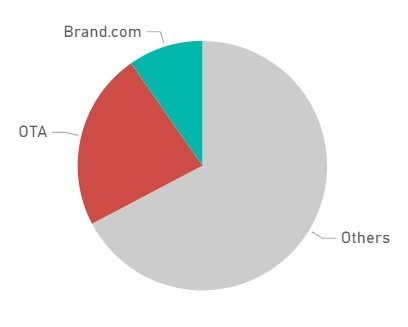
Room Nights by Booking Channel in 2021
How has COVID-19 influenced the digital roadmap of Minor Hotels?
Obviously, it’s been super tough. After all, we’re an international hotel chain that serves tourists - yet people can’t travel. We did see a huge drop in bookings, but we managed to reach pre-pandemic levels at certain times in the past year. And then we dropped off again.
We’ve been quick to work through other channels to make sure customers know what we’re doing. For example, we were one of the first hotel chains to partner with the Thai government last year on the domestic stimulus schemes. This move was beneficial for us since no one else was doing it at the time.
We have also gone contactless a lot more, starting with an app that helps guests reduce physical touchpoints when they visit our hotels. They can do many things on their mobile phones, such as checking in and opening their room doors.
What digitally-led innovations in hospitality excite you?
The shift towards contactless is good, and we’re trying to implement it across our portfolio.
For example, there are hotels in Australia with no service staff. A contactless experience works very well for such properties since guests can get their keys dispensed from a machine without interacting with anyone.
While I find contactless exciting, it's not necessarily the right approach for some of our other properties. For example, in the Maldives, you may have one or two butlers serving your residence.
I’m also really excited about personalisation and how we can really drill down to a micro level to give every customer exactly what they need. Whether it’s cost, add-ons, or inclusions, we want to increase the likelihood of people booking with us.
How are data and feedback recorded from the apps used?
Our IT team uses a data lake for financial reporting, which we’ve extended to include CRM data.
Our hotel websites also make use of user behaviour. There’s so much data available – CRM, customer booking, and financial data – and we’re also moving into analytics and website behavioural data. We’re already seeing some great insights and are extending the access to more teams throughout Minor Hotels.
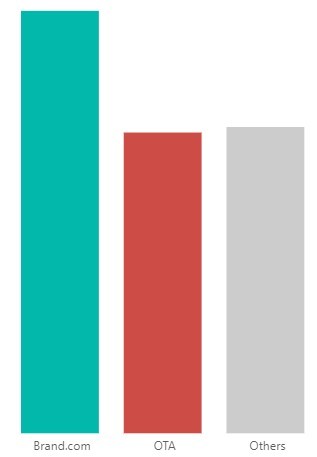
Average Daily Rate by booking channel in 2021. Average Daily Rate measures the average rental revenue earned for an occupied room per day.
What do you think of Buy Now, Pay Later (BNPL)?
BNPL is good, and it’s especially useful for weddings. Thai weddings are mega expensive, running into hundreds of thousands of baht, which is the equivalent of SGD20,000 to SGD30,000. So for things like this, we might want to use BNPL to pay for them. So far, it’s been working with the local banks we’ve partnered with, and we do want to try and expand it to more and more different products
As things stand now, expensive vacations are only done by the super rich. If we could just offer such vacations at a more affordable pace that is accessible to more people, that would be great. If BNPL gets widespread adoption in different countries, it would be excellent.
Last question, what do you like about 2C2P?
The thing about 2C2P that we really love is that you’ve got incredible flexibility and a good product. You’re also very open about what you can and cannot do. Even if there were things you couldn’t do, you’d find a solution for us.
So we were really, really happy with the tech and the people. So that's the key thing: we believe that we have to trust our business partners. And as partners, we’re very collaborative in our work. We don't want to be chopping and changing all the time, we want to choose a partner for life.
We have confidence in 2C2P and believe they're the right partner for payments. And so now, we just got to deliver on our side, we got to deliver the technology, and we got to deliver the customers.
. . .
Payments Powerhouses is a monthly editorial series interviewing the movers and shakers of the payments and wider fintech industry, in Southeast Asia and beyond. If you’d like to be featured on Payments Powerhouses, reach out to us here.
